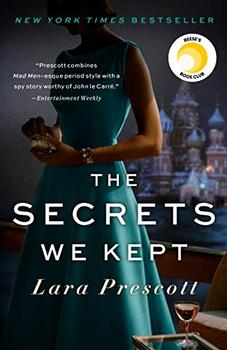Summary | Excerpt | Reading Guide | Reviews | Beyond the Book | Readalikes | Genres & Themes | Author Bio

A novel
by Lara Prescott
We think of Virginia, sitting at a similar desk—her thick yellow cardigan wrapped around her shoulders no matter the season, a pencil stuck in the bun atop her head. We think of her one fuzzy blue slipper underneath her desk—no need for the other, her left leg amputated after a childhood hunting accident. She'd named her prosthetic leg Cuthbert, and if she had too many drinks, she'd take it off and hand it to you. Virginia rarely spoke of her time in the OSS, and if you hadn't heard the secondhand stories about her spy days you'd think she was just another aging government gal. But we'd heard the stories. Like the time she disguised herself as a milkmaid and led a herd of cows and two French Resistance fighters to the border. How the Gestapo had called her one of the most dangerous of the allied spies—Cuthbert and all. Sometimes Virginia would pass us in the hall, or we'd share an elevator with her, or we'd see her waiting for the number sixteen bus at the corner of E and Twenty-First. We'd want to stop and ask her about her days fighting the Nazis—about whether she still thought of those days while sitting at that desk waiting for the next war, or for someone to tell her to go home.
They'd tried to push the OSS gals out for years—they had no use for them in their new cold war. Those same fingers that once pulled triggers had become better suited for the typewriter, it seemed.
But who were we to complain? It was a good job, and we were lucky to have it. And it was certainly more exciting than most government gigs. Department of Agriculture? Interior? Could you imagine?
The Soviet Russia Division, or SR, became our home away from home. And just as the Agency was known as a boys' club, we formed our own group. We began thinking of ourselves as the Pool, and we were stronger for it.
Plus, the commute wasn't bad. We'd take buses or streetcars in bad weather and walk on nice days. Most of us lived in the neighborhoods bordering downtown: Georgetown, Dupont, Cleveland Park, Cathedral Heights. We lived alone in walk-up studios so small one could practically lie down and touch one wall with her head and the other with her toes. We lived in the last remaining boarding houses on Mass. Avenue, with lines of bunk beds and ten-thirty curfews. We often had roommates—other government gals with names like Agnes or Peg who were always leaving their pink foam curlers in the sink or peanut butter stuck to the back of the butter knife or used sanitary napkins improperly wrapped in the small wastebasket next to the sink.
Only Linda Murphy was married back then, and only just married. The marrieds never stayed long. Some stuck it out until they got pregnant, but usually as soon as an engagement ring was slipped on, they'd plan their departure. We'd eat Safeway sheet cake in the break room to see them off. The men would come in for a slice and say they were awfully sad to see them go; but we'd catch that glimmer in their eye as they thought about whichever newer, younger girl might take their place. We'd promise to keep in touch, but after the wedding and the baby, they'd settle down in the farthest corners of the District—places one would have to take a taxi or two buses to reach, like Bethesda or Fairfax or Alexandria. Maybe we'd make the journey out there for the baby's first birthday, but anything after that was unlikely.
Most of us were single, putting our career first, a choice we'd repeatedly have to tell our parents was not a political statement. Sure, they were proud when we graduated from college, but with each passing year spent making careers instead of babies, they grew increasingly confused about our state of husbandlessness and our rather odd decision to live in a city built on a swamp.
And sure, in summer, Washington's humidity was thick as a wet blanket, the mosquitoes tiger-striped and fierce. In the morning, our curls, done up the night before, would deflate as soon as we'd step outside. And the streetcars and buses felt like saunas but smelled like rotten sponges. Apart from a cold shower, there was never a moment when one felt less than sweaty and disheveled.
Excerpted from The Secrets We Kept by Lara Prescott. Copyright © 2019 by Lara Prescott. All rights reserved. No part of this excerpt may be reproduced or reprinted without permission in writing from the publisher.
Your guide toexceptional books
BookBrowse seeks out and recommends the best in contemporary fiction and nonfiction—books that not only engage and entertain but also deepen our understanding of ourselves and the world around us.